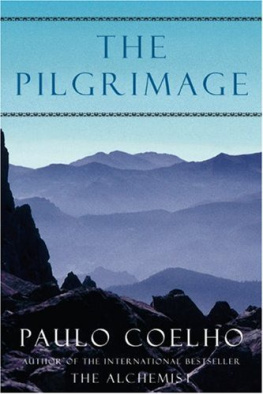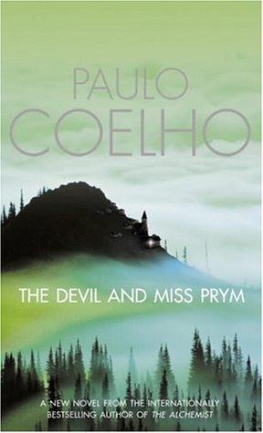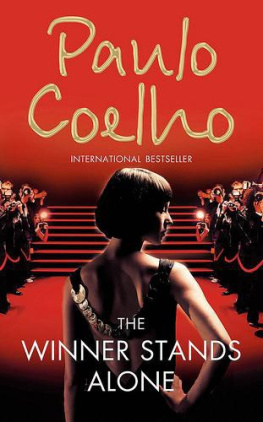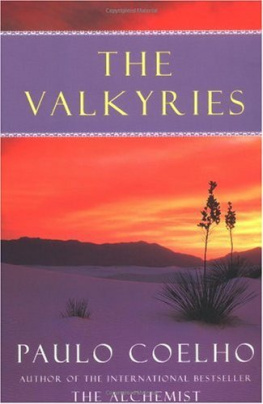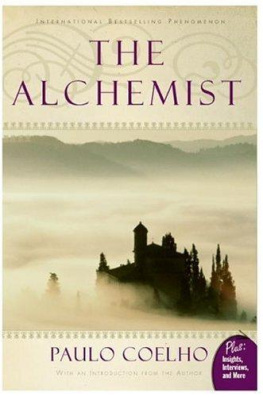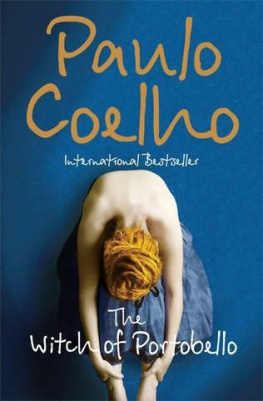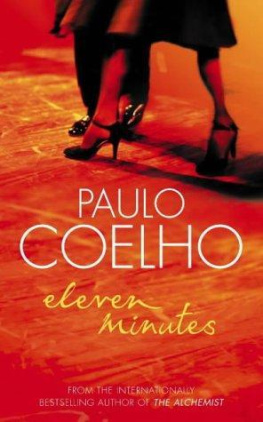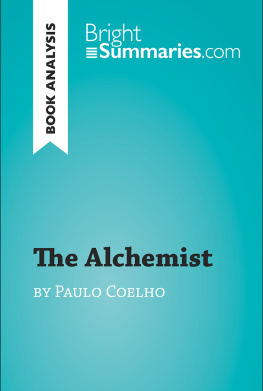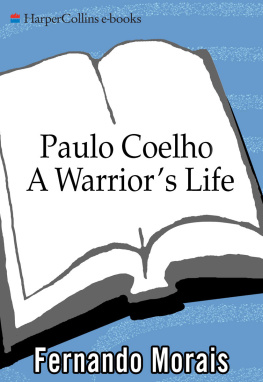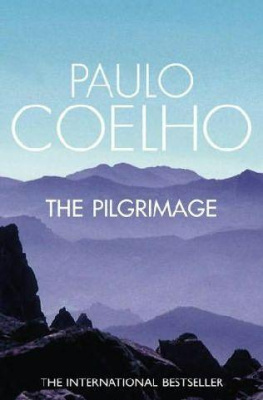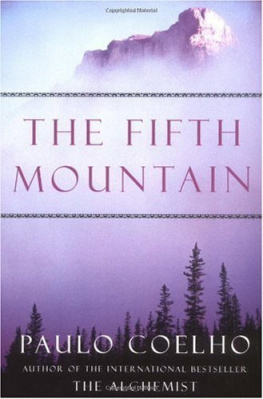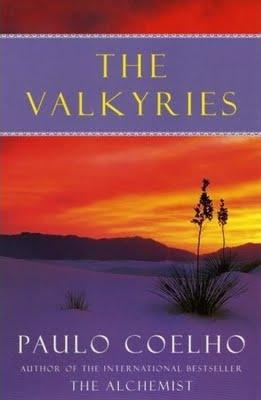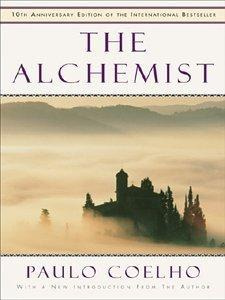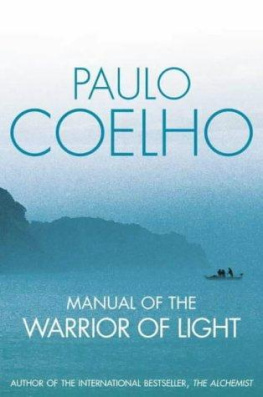The Messenger
And here all Roads to Santiago become one. It was early in the morning when we reached Puente de la Reina, where the name of the village was etched into the base of a statue of a pilgrim in medieval garb: three-cornered hat, cape, scallop shells, and in his hand a shepherds crook. With a gourd a memorial to the epic journey, now almost forgotten, that Petrus and I
were reliving. We had spent the previous night at one of the many
monasteries along the Road. The brother of the gate who had greeted us had warned us that we were not to speak a word within the walls of the abbey. A young monk had led each of us to an alcove, furnished only with the bare necessities: a hard bed, old but clean sheets, a pitcher of water and a basin for personal hygiene. There was no plumbing or hot water, and the schedule for meals was posted behind the door.
At the time indicated, we had come down to the dining hall. Because of the vow of silence, the monks communicated only with their glances, and I had the impression that their eyes gleamed with more intensity than those of other people. The supper was served early
at narrow tables where we sat with the monks in their brown habits. From his seat, Petrus had given me a signal, and I had understood perfectly what he meant: he was dying to light a cigarette, but it looked like he was going to have to go through the entire night with- out one. The same was true for me, and I dug a nail into the cuticle of my thumb, which was already like raw meat. The moment was too beautiful for me to commit any kind of cruelty toward myself.
The meal was served; vegetable soup, bread, fish, and wine. Everyone prayed, and we recited the invoca- tion with them. Afterward, as we ate, a monk read from an Epistle of Saint Paul.
But God hath chosen the foolish things of the world to put to shame the wise, and God hath chosen the weak things of the world to put to shame the things which are mighty, read the monk in a thin, tuneless voice. We are fools for Christs sake. We are made as filth of the world and are the offscouring of all things unto this day. But the kingdom of God is not in word but in power.
The admonitions of Paul of the Corinthians echoed off the bare walls of the dining hall throughout the meal. As we entered Puente de la Reina we had been talk
ing about the monks of the previous night. I confessed to Petrus that I had smoked in my room, in mortal fear that someone would smell my cigarette burning. He laughed, and I could tell that he had probably been doing the same thing.
Saint John the Baptist went into the desert, but Jesus went among the sinners, and he traveled endlessly, Petrus said, Thats my preference, too.
In fact, aside from the time he had spent in the desert, Jesus had spent all of his life among people.
Actually, his first miracle was not the saving of someones soul nor the curing of a disease, and it wasnt an expulsion of the devil; it was the transforma- tion of water into an excellent wine at a wedding because the wine supply of the owner of the house had run out.
After Petrus said this, he suddenly stopped walking. It was so abrupt that I became alarmed and stopped, too. We were at the bridge that gave its name to the vil- lage. Petrus, though, wasnt looking at the road in front of us. His eyes were fastened on two boys who were playing with a rubber ball at the edge of the river. They were eight or ten years old and seemed not to have noticed us. Instead of crossing the bridge, Petrus scram- bled down the bank and approached the two boys. As always, I followed him without question.
The boys continued to ignore us. Petrus sat down to watch them at play, until the ball fell close to where he was seated. With quick movement, he grabbed the ball and threw it to me.
I caught the ball in the air and waited to see what would happen.
One of the boys the elder of the two approached me. My first impulse was to throw him the ball, but
Petruss behavior had been so unusual that I decided that I would try to understand what was happening.
Give me the ball, Mister, said the boy.
I looked at the small figure two meters away from me. I sensed that there was something familiar about him. It was the same feeling I had about the gypsy.
The lad asked for the ball several times, and when he got no response from me, he bent down and picked up a stone.
Give me the ball, or Ill throw a stone at you, he said.
Petrus and the other boy were watching me silently. The boys aggressiveness irritated me.
Throw the stone, I answered. If it hits me, Ill come over there and whack you one.
I sensed that Petrus gave a sigh of relief. Something in the back of my mind told me that I had already lived through this scene.
The boy was frightened by what I said. He let the stone fall and tried a different approach.
Theres a relic here in Puente de la Reina. It used to belong to a rich pilgrim. I see by your shell and your knapsack that you are pilgrims. If you give me my ball, Ill give you the relic. Its hidden in the sand here along the river.
I want to keep the ball, I answered, without much conviction. Actually, I wanted the relic. The boy seemed to be telling the truth. But maybe Petrus needed the ball for some reason, and I didnt want to disappoint him. He was my guide.
Look, Mister, you dont need the ball, the boy said, now with tears in his eyes. Youre strong, and youve been around, and you know the world. All I know is the edge of this river, and that ball is my only toy. Please give it back.
The boys words got to me. But the strangely familiar surroundings and my feeling that I had already read about or lived through the situation made me refuse again.
No, I need the ball. Ill give you enough money to buy another one, even better than this one, but this one is mine.
When I said that, time seemed to stop. The sur- roundings began to change, even without Petruss finger at my neck; for a fraction of a second, it seemed that we had been transported to a broad, terrifying, ashen desert. Neither Petrus nor the other boy was there, just myself and the boy in front of me. He was old, and his features were kinder and friendlier. But there was a light in his eyes that frightened me.
The vision didnt last more than a second. Then I was back at Puente de la Reina, where the many Roads to Santiago, coming from all over Europe, became one. There in front of me, a boy was asking for his ball, with a sweet, sad look in his eye.
Petrus approached me, took the ball from my hand, and gave it to the boy.
Where is the relic hidden? he asked the boy.
What relic? he said, as he grabbed his friends hand, jumped away, and threw himself into the water.
We climbed the bank and crossed the bridge. I began to ask questions about what had happened, and I described my vision of the desert, but Petrus changed the subject and said that we should talk about it when we had traveled further from that spot.
Half an hour later, we came to a stretch of the Road that still showed vestiges of Roman paving. Here was another bridge, this one in ruins, and we sat down to have the breakfast that had been given to us by the monks: rye bread, yogurt, and goats cheese.
Why did you want the kids ball? Petrus asked me.
I told him that I hadnt wanted the ball that I had acted that way because Petrus himself had behaved so strangely, as if the ball were very important to him.
In fact, it was. It allowed you to win out over your personal devil.
My personal devil? This was the most ridiculous thing I had heard during the entire trip. I had spent six days coming and going in the Pyrenees, I had met a sorcerer priest who had performed no sorcery, and my finger was raw meat because every time I had a cruel thought about myself from hypochondria, to feelings of guilt, to an inferiority complex I had to dig my fingernail into my wounded thumb. But about one thing Petrus was right: my negative thinking had diminished considerably. Still, this story about having a personal devil was something I had never heard and I wasnt going to swallow it easily.

